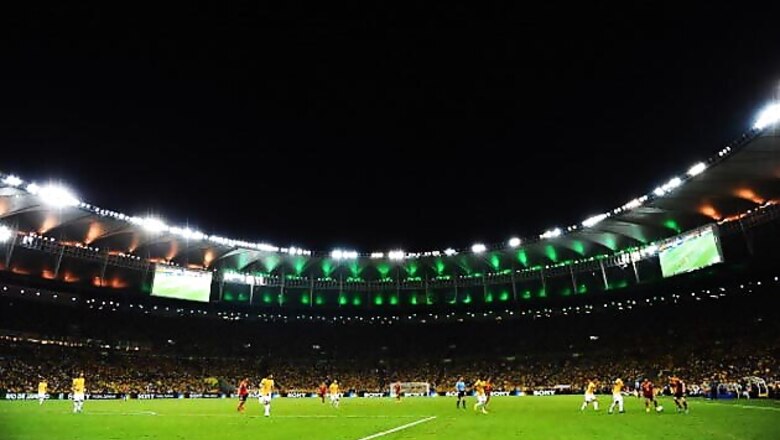
views
Sao Paulo: Conditions at Brazil's new soccer stadiums have plummeted since the Confederations Cup ended and the arenas started holding Brazilian league matches, say fans and journalists who accuse football authorities of double standards. Media facilities have been dismantled, roads to stadiums are clogged with traffic and high ticket prices have left seats empty, they say.
"They took away the desks, the chairs, the internet, everything, and we had to work with our equipment balanced on the roof of the substitutes' bench," said Rener Lopes, a commentator for local radio station Esporte Brasilia.
"We had to watch what we said because if we said something the fans beside us thought was critical of their team they'd scream at us. There is one standard for FIFA and another for the Brazilian league," said fan Andre Doria, comparing facilities at the National Stadium in Brasilia during the FIFA-run Confederations Cup, which ended three weeks ago, and at games organised by Terracap, the agency now running the stadium for the city government.
The National Stadium, which won plaudits when FIFA hosted the Confederations Cup opener there, was one of six used for the event, a test for next year's World Cup in Brazil.
FIFA took control of the six arenas weeks before the tournament began and installed its own facilities, including modern media centres. It set up concession stands run by FIFA sponsors such as Coca-Cola and brought in hundreds of volunteers and stewards, as well as collaborating with local authorities to close roads around the venues to make access easier.
Since the cup finished, the concession stands have been replaced by shacks, the media centres have been removed and, with the roads open as normal, fans have to get to the ground through heavy traffic.
PUBLIC PROTESTS
The situation is particularly sensitive coming weeks after a wave of popular unrest spread across Brazil, with protesters in many cities angry about stadiums built with public money while schools, hospitals and public transportation remained underfunded.
"FIFA has a standard of management that is all their own," said Ricardo Araujo, a stadium management consultant and author of the blog Novas Arenas. Outside those events the responsibility is transferred to the concessionaries and it doesn't seem to me that they are ready to manage them on a day-to-day basis."
On Sunday, Vasco da Gama played Fluminense in the Maracana, the ground that will host the World Cup final next July. It was the first Rio derby since Complexo Maracana Entretenimento took over management of the stadium and more than 46,000 supporters watched the game.
While fans of the two clubs filled the ends of the ground, the middle of the stadium was empty. The clubs, who get their income from ticket sales, had sold their allocation for 60 reais while Complexo Maracana, which also sells tickets, priced theirs at 300 reais, an amount few were willing to pay.
The company declined to answer questions about its pricing and said the empty spaces were because police had asked them to reduce capacity for the derby. Terracap officials said they had made changes after the first match at the National and would continue to improve services. Claudio Monteiro, Brasilia's special secretary for World Cup planning, said improvements would come.
"I recognise that there are deficiencies in the way fans are treated," he said. "FIFA did everything and I can't offer today all I'd like to offer. Today the clubs are learning. We will only reach that standard after the World Cup, until then we will keep improving."



















Comments
0 comment